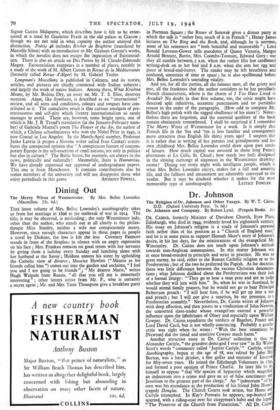Dining Out
The Merry Wives of Westminster. By Mrs. Belloc Lowndes. (Macmillan. 12s. 6d.) The Merry Wives of Westminster. By Mrs. Belloc Lowndes. (Macmillan. 12s. 6d.)
THIS latest volume of Mrs. Belloc Lowndes's autobiography takes us from her marriage in 1896 to the outbreak of war in 1914. The title, it may be observed, is misleading ; the only Westminster lady, other than the author, who stands out at all clearly is the philan- thropic Miss Stanley, neither a wife nor conspicuously merry. However, since enough characters appear in these pages to people a novel by Dickens, the loss is felt the less. Coventry Patmore stands in front of the fireplace. in silence with an angry expression on his face ; Mrs. Frankau remains on good terms with her servants by giving them a holiday every Sunday and lunChing alone with her husband at the Savoy ; Haldane annoys his sister by upholding the Catholic view of divorce ; Maurice Hewlett (" Maurie as his friends called him ") comes out into the garden and exclaims, " I feel you and I are going to be friends"; " My dearest Marie," writes Hugh Walpole from Russia, " all that you tell one is immensely interesting " ; other letters arrive from Mr. F., who is certainly a secret agent ; Mr. and Mrs. Yates Thompson give a breakfast party in Portman Square ; the Ranee of Sarawak gives a dinner party at which the talk is " rather free, much of it in French " ; Henry James lectures on The Ring and the Book, and, although he is nervous, some of his sentences are " both beautiful and memorable "Lord Ronald Leveson-Gower tells anecdotes of Queen Victoria, Margot Arnold Bennett, Barrie, Mrs. Coombe-Tennant, Edward Grey : out they all tumble between, 5 am. when the author lifts hes cardboard writing-desk on to her bed and 8 am. when she eats her egg and piece of bread-and-butter. The reader may be left breathless and confused, uncertain of time or space ; he is also spellbound before Mrs. Belloc Lowndes's unending vitality.
And yet, for all the parties, all the famous men, all the gaiety and zest, all the frankness that the author considers to be her peculiarly French characteristic, where is the charm of I Too Have Lived in Arcadia? No doubt in that first volume, too, the critic might have detected split infinitives, eccentric punctuation and no particular reason in the order of the paragraphs. (How odd to compare Mr. Belloc's high polish with the ragged ebullience of his sister!) Never- theless these are forgotten, and the essential qualities of the book remain obstinately remembered. I shall be surprised if I remember The Merry Wives of Westminster for a week. Is it simply that French life in the '6os and • '7os is less familiar and consequently more attractive than English life thirty years ago? I suspect- tha' it is rather that in writing of her parents and grandparents and her own childhood Mrs. Belloc Lowndes could draw upon past stocks of leisure. How much capital was amassed in those long French afternoons at La Celle, St. Cloud ; how much (Ave feel) dissipated in the shining exchange of sixpences in the Westminster drawing- rooms ! Dining out every night with intelligent people, which is what Mrs. Belloc Lowndes enjoys, makes for a full and amusing life, and the fullness and amusement are admirably conveyed to the reader. But it may be doubted whether it makes for the most memorable type of autobiography. LETTICE FOWLER.


























 Previous page
Previous page